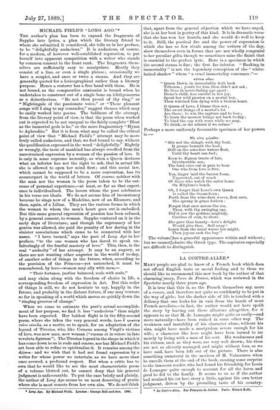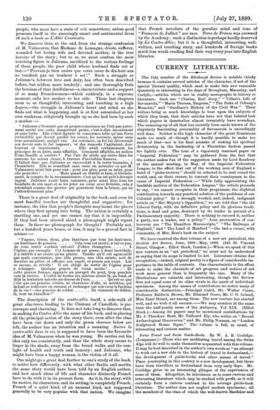LA CONTRE-ALLEE.*
MANY people are glad to know of a French book which does not offend English taste or moral feeling, and to them we should like to recommend this new book by the author of that charminestory, Terre de France, which was reviewed in the Spectator nearly three years ago.
It is true that this is, as the French themselves say, more of a roman, and therefore not quite so confidently to be put in the way of girls ; but the darker side of life is touched with a delicacy that one looks for in vain from the hands of most French novelists,—in fact, the author would not have spoilt the story by leaving out these allusions altogether, for it appears to us that M. de Lomagne might quite as easily—and more naturally—have been ruined in some other way. The weakness and instability of his character alone, without his sins, might have made a martyrdom severe enough for his wife; a character like hers might have been turned to ice merely by living with a man of his sort. His weaknesses and his virtues, such as they were, are very well drawn; his vices are not so cleverly managed, and might without loss, as we have said, have been left out of the picture. There is also something unnatural in the motives of M. Valmaures, when he unveils them at the end of the book, causing some surprise to the innocent reader, who had found his friendship for Louis de Lomagne quite enough to account for all the harm and good he did to the family. It seems to us as if the author had strained his (or her) story a little, against his own better judgment, driven by the prevailing taste of his country- * Is Centre-41W. Par Francois de Julliot. Paris: Ernest olb. people, who must have a stain of evil somewhere, unless good presents itself in the amazingly smart and sentimental dress of such a book as L'Abbe Constantin.
We discover thus, at the end, from the strange confession of M. Valmanres, that Madame de Lomagne, devote, sufferer,
wounded but loving wife and devoted mother, is the true heroine of the story ; but to us, we must confess, the most
touching figure is Julienne, sacrificed to the various feelings of these people, the poor child whose husband finds out at last,—"Pouvais-je bien croire que votre cceur de dix-huit ans
ne voudrait pas un bonheur a soi !" Such a struggle as Julienne's, between love and duty, has often been described before, but seldom more tenderly ; and one thoroughly feels the heroism of that dutifulness—a characteristic and a support of so many Frenchwomen—which suddenly, in a supreme moment, calls her mother to her side. These last chapters seem to us thoughtful, interesting, and touching in a high degree,—the struggle in Julienne's heart and mind, as she finds out what is happening, and is at first astonished at her own weakness, religiously brought up as she had been by such a mother :— " Julienne s'etonnait que sa propre conscience no Pent pas antra- meat arrete stir cede dangereuse pente, c'est-i-dire incontinent et sans lutte. Elle s'etait figuree la conscience telle qu'une force irresistible qui devait garder lee coeurs, lee secotuir, mime sans leur assentiment, malgre eux. An contraire, sa foi lui decouvrait son devoir sans le lui imposer; et des remords l'agitaient, don- loureux et impuissants Elle avait certainement lee principes de sa mere, mais affaiblis. Comment affaiblis, an milieu d'une famille si austere ? Par Pair du siècle qui entre dans lea
maisons lea mieux closes, a. travers d'invisibles fissures 11 fallait done que Julienne se raccrochat a in vertu humaine, l'honnetete. Elle se remettait sans cease en memoire ce que M. Valmaures avait fait pour eux : pour son per°, pour sa mere, pour elle peutretre Mais quand on etablit si bien, si liberale- ment, le compte de la reconnaissance, c'est qu'on eat pret a devenir ingrat. Julienne avait beau ramasser, pour ainsi dire, tom lea bienfaits de son man i et se lee jeter an cceur avec frenesie, cola y retombait comme des pierres qui pouvaient bien le briser, qui ne Pattendrissaient plus."
There is a great deal of originality in the book, and even its most fanciful touches are thoughtful and suggestive; for instance, the idea that people's thoughts may haunt the places where they first sprang into being. The notion is certainly a
startling one, and yet one cannot say that it is impossible. If they had been uttered aloud, a phonograph might repeat
them. Is there no phonograph for thought? Probably not, but a hundred years hence, or less, it may be a proved fact in science :—
" Vag-ues, tenus, flow, plus fantomes que tons lee fantemes, ces fantemes de pensees Cola vous eat arrive, n'est-ce pas, de vous sentir soudain entoure d'idees etrangeres. . . . . A l'eglise, par exemple. Cet homme-la set jenne, a demi incredule, il a interet è. ne croire qu'au plaisir. Tandis gull est agenouille par seule convenance, use idee pieuse, use idea sainte, sort de derriere un pilier, et effteure son esprit, et presse son coeur. Lni se secoue, se revolt° ! Ii set oblige de sortir de l'eglise pour
y echapper. Quelque pensee de vieux moms' Et cotta pauvre femme, appuyee an parapet du pont, trop penchee yen in riviere. L'oubli de toutes sea miseres serait an fond, et
déjà is tentation miroite an-dessus de Pe= Qu'est-ce que c'est que ces pensees viriles, ni cherchees d'elle, ni meritees, qui in font se redresser en sursaut et recharger stir son co3ur le fardeau
de la vie ?—des pensees de soldat us viennent de defiler, la, tout un bataillon I"
The description of the contre-all‘e itself, a side-walk of great elm-trees, leading to the Chateau of Castelfols, is pic- turesque and charming. It does not take long to discover that, in making La Contre-Allee the name of his book, and in placing all the principal action of the story there, even after the elms have been cut down and only the green charmes below are left, the author has an intention and a meaning. Suivre la contre-allee dans ice vie, is supposed to have been the favourite idea of M. Valmaures when he was young. He carries out his idea only too consistently, and thus the whole story seems to linger in the shade, away from the broad walks and the sun- light of health and truth and honesty ; and Julienne, who might have been a happy woman, is the victim of it all.
One might go a great deal farther in one's study of the book, to notice how differently, with what other faults and merits, the same story would have been told by an English author, and how much ideas of life and character distinctly French have to do with it in its present form. As it is, the story, with its motive, its characters, and its setting, is completely French, French of a quiet kind, of an unusual kind, not supposed generally to be very popular with that nation. We imagine
that French novelists of the peculiar mind and tone of "Francois de Julliot " are rare. Terre de France was crowned by the Academy : such a distinction is perhaps hardly deserved by La Contre-Allee ; but it is a thoughtful, interesting, well- written, and touching story, and hundreds of foreign books much less worth reading find their way every year into English libraries.



































 Previous page
Previous page